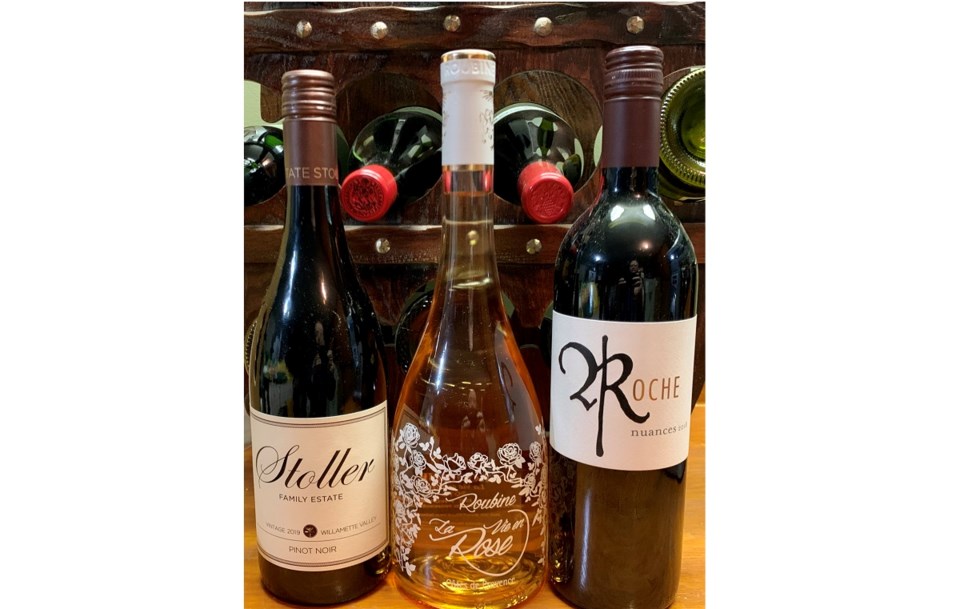Join us as we kiss April goodbye and travel to the south of France, go west to Oregon, and then head back home to BC’s Okanagan Valley as we explore the enchanting world of wine!
No May afternoon is complete without a drop or two or more of the pale pink/orange wines from France’s Provence. And a delicious certified organic example is the 2019 Chateau Roubine La Vie en Rosé ($27.99 at BC Liquor stores; 90 points, Outstanding!). Produced from Grenache, Cinsault, and Syrah, which are the lifeblood of wines from southern France, it immediately grabs your attention with its salmon-coloured colour in its white etched bottle.
There are gentle and seductive aromatics including cherries, roses (very appropriate for a rosé), muscat perfume, and orange. On the palate expect flavours of strawberries, peach, watermelon, and orange together with bright acidity a hint of tannins to give it a light body, and a refreshing dry finish.
Absolutely perfect for casual spring sipping outdoors as well as a complement to soft cheeses such as brie or goat’s cheese. Also delicious with hummus and flatbread, feta cheese and nicoise salads, or seafood. Almost anything tastes better with a rosé as long as the dish is not strongly flavoured.
From Provence we move to the Dundee Hills of Oregon with the with the Stoller Family Estate 2019 Willamette Valley Pinot Noir ($39.99 at Marquis Cellars in Vancouver; 90 points, Outstanding!).
At Stoller, their roots run deep having worked the land since the 1940’s, Second-generation owner Bill Stoller has turned the 400-acre property into the largest vineyard in the Dundee Hills. And he’s done it sustainably.
The very factors such as rocky terrine and low yielding soil that made their land a poor choice for traditional crops make it ideal for an award winning vineyard. Their 2018 vintage earned a place in Wine Spectator’s 2020 Top Wines.
Dark crimson in colour, there’s deep red and black fruit in this medium bodied Pinot with vanilla, earthy scents and mushrooms in the aroma. Flavours of black cherries, cola, and raspberries greet your palate. There’s a good measure of acidity to balance the fruit, as you would expect from a cool climate like Oregon’s. A spicy finish leaves a very favourable impression.
With its chewy tannins, this is definitely meant to be served with food, such as wild BC salmon, mushroom risotto, and asparagus, or smoked pork shoulder with Brussels sprouts, couscous and butternut squash.
Our second red is the 2018 Roche Nuances ($38.50 available at Vancouver’s Marquis Wine Cellars; 90 points, Outstanding!). The new vintage 2019 Nuances is available for Wine Club Members at Roche Wines.
The name, Nuances is well suited for this is a wine for those who enjoy a subtler and refined red. It’s from an artisan winery with deep roots in French tradition. Winemaker Dylan Roche and his Vigneron wife Penelope share a passion for soils, vines, and wine. They both worked at wineries in New Zealand and at Penelope’s family winery in Bordeaux before moving to the Okanagan.
Roche Nuances is a Bordeaux-style blend of Merlot, Cabernet Franc, and Cabernet Sauvignon from vineyards in Naramata and Oliver. The grapes were hand-harvested, fermented in stainless steel, and aged for a year in French oak.
I opened it the day before I tasted it and that decanting allowed the deep garnet wine to reveal its charms. The first sniff was like a fresh spring breeze with seductive vanilla and cigar box and rich red and black fruit.
On the palate there was toasted oak and smooth flavours as well as plums, black cherry, and cassis. There are moderate tannins and lively acidity and it slowly leaves a favourable impression with its very long finish.
Dylan Roche says he is not trying to imitate Bordeaux because our warmer climate and soils are not similar and therefore B.C. wines are unique. They don’t get the density and texture as in France. He actually thinks his Nuances tastes like Italian Chianti; it is more acidic and more rustic than Bordeaux.
I enjoyed the Nuances with a roast chicken dinner complemented with sausage pecan rice stuffing and homemade cranberry sauce. Both the wine and the dinner’s flavours were elevated to make for a delightful pairing!



